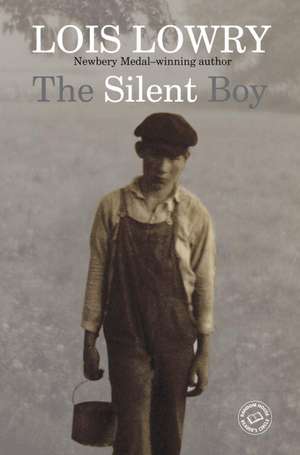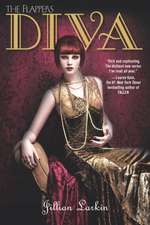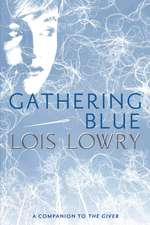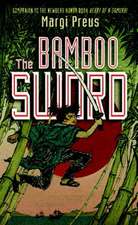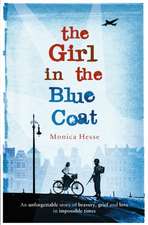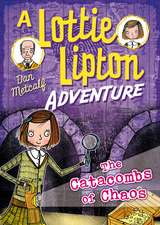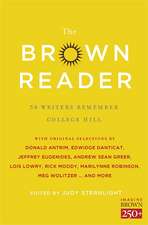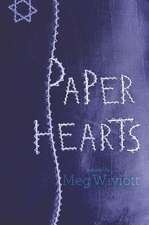The Silent Boy: Random House Reader's Circle
Autor Lois Lowryen Limba Engleză Paperback – 31 ian 2012 – vârsta de la 12 ani
“The author balances humor and generosity with the obstacles and injustice of Katy’s world to depict a complete picture of the turn of the 20th century.”—Publishers Weekly, Starred
From the Paperback edition.
| Toate formatele și edițiile | Preț | Express |
|---|---|---|
| Paperback (2) | 55.61 lei 3-5 săpt. | |
| HarperCollins Publishers – 5 iun 2017 | 55.61 lei 3-5 săpt. | |
| Ember – 31 ian 2012 | 74.62 lei 3-5 săpt. |
Din seria Random House Reader's Circle
-
 Preț: 107.68 lei
Preț: 107.68 lei -
 Preț: 100.16 lei
Preț: 100.16 lei -
 Preț: 115.49 lei
Preț: 115.49 lei -
 Preț: 111.29 lei
Preț: 111.29 lei -
 Preț: 100.83 lei
Preț: 100.83 lei -
 Preț: 117.39 lei
Preț: 117.39 lei -
 Preț: 139.68 lei
Preț: 139.68 lei -
 Preț: 106.04 lei
Preț: 106.04 lei -
 Preț: 102.86 lei
Preț: 102.86 lei -
 Preț: 106.42 lei
Preț: 106.42 lei -
 Preț: 95.48 lei
Preț: 95.48 lei -
 Preț: 98.78 lei
Preț: 98.78 lei -
 Preț: 108.90 lei
Preț: 108.90 lei -
 Preț: 128.86 lei
Preț: 128.86 lei -
 Preț: 81.80 lei
Preț: 81.80 lei -
 Preț: 128.64 lei
Preț: 128.64 lei -
 Preț: 103.03 lei
Preț: 103.03 lei -
 Preț: 125.84 lei
Preț: 125.84 lei -
 Preț: 105.22 lei
Preț: 105.22 lei -
 Preț: 103.44 lei
Preț: 103.44 lei -
 Preț: 91.55 lei
Preț: 91.55 lei -
 Preț: 65.10 lei
Preț: 65.10 lei -
 Preț: 108.72 lei
Preț: 108.72 lei -
 Preț: 115.34 lei
Preț: 115.34 lei -
 Preț: 115.08 lei
Preț: 115.08 lei -
 Preț: 91.46 lei
Preț: 91.46 lei -
 Preț: 119.55 lei
Preț: 119.55 lei -
 Preț: 94.23 lei
Preț: 94.23 lei -
 Preț: 120.71 lei
Preț: 120.71 lei -
 Preț: 131.94 lei
Preț: 131.94 lei -
 Preț: 57.77 lei
Preț: 57.77 lei -
 Preț: 128.33 lei
Preț: 128.33 lei -
 Preț: 104.59 lei
Preț: 104.59 lei -
 Preț: 124.72 lei
Preț: 124.72 lei -
 Preț: 116.76 lei
Preț: 116.76 lei -
 Preț: 105.41 lei
Preț: 105.41 lei -
 Preț: 90.64 lei
Preț: 90.64 lei -
 Preț: 104.81 lei
Preț: 104.81 lei -
 Preț: 108.50 lei
Preț: 108.50 lei -
 Preț: 117.80 lei
Preț: 117.80 lei -
 Preț: 120.26 lei
Preț: 120.26 lei -
 Preț: 122.45 lei
Preț: 122.45 lei -
 Preț: 98.12 lei
Preț: 98.12 lei -
 Preț: 92.18 lei
Preț: 92.18 lei -
 Preț: 97.35 lei
Preț: 97.35 lei -
 Preț: 92.83 lei
Preț: 92.83 lei -
 Preț: 96.71 lei
Preț: 96.71 lei -
 Preț: 91.14 lei
Preț: 91.14 lei -
 Preț: 84.56 lei
Preț: 84.56 lei
Preț: 74.62 lei
Nou
Puncte Express: 112
Preț estimativ în valută:
14.28€ • 14.85$ • 11.97£
14.28€ • 14.85$ • 11.97£
Carte disponibilă
Livrare economică 20 februarie-06 martie
Preluare comenzi: 021 569.72.76
Specificații
ISBN-13: 9780307976086
ISBN-10: 0307976084
Pagini: 178
Dimensiuni: 140 x 206 x 13 mm
Greutate: 0.18 kg
Editura: Ember
Seria Random House Reader's Circle
ISBN-10: 0307976084
Pagini: 178
Dimensiuni: 140 x 206 x 13 mm
Greutate: 0.18 kg
Editura: Ember
Seria Random House Reader's Circle
Extras
SEPTEMBER 1908
My friend Austin Bishop lived next door and was to be invited to my sixth birthday party the next month. Austin was already six and said that he could read. I thought it was true because he showed me a book with a story in it and told me the story--it was about a mouse--and then he told me the story again, and the words were exactly the same. Reading, I knew, was what made the words always, always be the same.
Jessie Wood was to come to my party, too, and had told me a secret, that she was bringing me a tea set with pink flowers as a birthday present. She had promised her mother that she would not tell. A promise was a very important, very grown-up thing, and if I promised not to tell something, I would never ever tell. But Jessie was often naughty. She disobeyed. She told me that the pink flowers were roses and the tea set was real china.
Austin's brother, Paul, was not invited because he was too big. Paul was almost fifteen years old and had his own desk, many pencils, and a book with maps. He had a pocketknife that was very sharp and we were not to touch it, ever. He tried to smoke his father's pipe but he was too young, and it made him sick. We saw him being sick out by the barn. It was yellow and splattered on his shoes.
Austin's father was named Mr. Bishop, and he was a lawyer, but at home he spent a lot of time out in the barn, pounding and sawing. He liked tools and steam engines and wheels and anything that moved its parts and made noise. Sometimes he said he wished he could be a train engineer. During the summer, when Austin's birthday was coming, Mr. Bishop and Paul worked many days out in the barn. It was a secret. No one could peek. They made a lot of noise, and it was a surprise for Austin's birthday.
My mother said, when she saw what they had made, that it was a amazing. I had never seen a amazing before. It had wheels, but it was not a velocipede. Everyone had a velocipede, even me.
I was allowed to ride mine to the mailbox, but then I was always to turn around and come back.
Austin could sit in his amazing. He pushed with his feet on the pedals and he traveled down the walk. I supposed he could go to town in the amazing if he wished. Perhaps he could go to his father's office. Or to the library, or Whittaker's Dry Goods! A amazing could go anywhere.
I hoped that someone was building me a amazing for my birthday, but I didn't think that anyone was because there was no noise coming from the Bishops' barn or from our stable, except the plain old noise of the horses snorting and stamping their feet as Levi cleaned their stalls.
Our horses were named Jed and Dahlia, and they were brown but their manes and tails were black. Our cook was named Naomi, and she was also brown. Everything has a color, I remember thinking. I could not think of a single thing that had no color, except the water in my bath. You could see through water, I realized--could see your own hand when you tried to hold water in it, but then it ran away, right through your fingers, no matter how hard you tried to keep it there.
Austin had one more thing besides the amazing, one more thing that I wished I had. He had a baby sister! She had horrid black hair and cried a lot and her name was Laura Paisley Bishop.
How they got Laura Paisley was very, very interesting to me. Austin's Nana took him on the train to Philadelphia for a whole day. How I wished my grandmother would do that for me! My own Gram lived in Cincinnati and came by train in the summers to visit, but she never took me with her on the train. Austin said it was noisy and clattery and you could look through the windows and see trees go by as fast as anything. Sometimes, when the train was going around a curve, you could look ahead and see the engine and know that you were part of it, still attached. It was hard to imagine.
They rode to Philadelphia and went to a museum, where they saw stuffed creatures, like bears, posing as if they were alive, and then they had lunch in a restaurant, with strawberry ice cream for dessert. Then they went back to the train station and came all the way home on the train again. When they arrived at our town, Austin's Nana used the telephone at the railroad station to call his home and see if anything exciting had happened while they were away.
"My goodness!" she said to Austin, then. "There will be quite a surprise at your house when we get there."
So they walked all the way home from the station, and when they got to Austin's house, he saw the surprise. It was a baby sister!
They had found her out in the garden. That's what they told Austin: that his mother had gone outside to pick some tomatoes for lunch, and when she looked down, she saw a lovely baby girl there.
"Fibber!" I said to Austin.
I did not believe him because I had been playing in my own backyard almost all day, and never once heard a baby, and did not see Mrs. Bishop go out with her tomato basket at all. In fact, my mother had told me to play quietly because Mrs. Bishop had a headache and was lying down most of the day.
So I called Austin a fibber and he was angry and threw some dirt at me and said I could never hold his baby. But I asked my mother later and she said it was true that Mrs. Bishop had found the baby in the garden. Mother said that she hoped someday we would find one in ours.
So I decided I would look carefully each day. But it seemed a very strange thing, that babies appeared in gardens, because it might be raining. Or it might even be winter! I hoped that the babies were bundled up in thick blankets then!
I had to apologize to Austin for calling him a fibber. His big brother, Paul, was there when I did, and Paul laughed and said I shouldn't bother. Paul said I was the smartest child on the street. (It was not true, because I couldn't read yet, no matter how I tried.) But his mother, who was sitting in a rocking chair holding Laura Paisley, said, "Shhhhh," so Paul shushed and went away and slammed the screen door behind him, which startled the baby, so that her eyes opened wide for a second and then closed again.
I hoped her hair would improve because it really was horrid to look at. It was exactly like Jed and Dahlia's manes.
From the Paperback edition.
My friend Austin Bishop lived next door and was to be invited to my sixth birthday party the next month. Austin was already six and said that he could read. I thought it was true because he showed me a book with a story in it and told me the story--it was about a mouse--and then he told me the story again, and the words were exactly the same. Reading, I knew, was what made the words always, always be the same.
Jessie Wood was to come to my party, too, and had told me a secret, that she was bringing me a tea set with pink flowers as a birthday present. She had promised her mother that she would not tell. A promise was a very important, very grown-up thing, and if I promised not to tell something, I would never ever tell. But Jessie was often naughty. She disobeyed. She told me that the pink flowers were roses and the tea set was real china.
Austin's brother, Paul, was not invited because he was too big. Paul was almost fifteen years old and had his own desk, many pencils, and a book with maps. He had a pocketknife that was very sharp and we were not to touch it, ever. He tried to smoke his father's pipe but he was too young, and it made him sick. We saw him being sick out by the barn. It was yellow and splattered on his shoes.
Austin's father was named Mr. Bishop, and he was a lawyer, but at home he spent a lot of time out in the barn, pounding and sawing. He liked tools and steam engines and wheels and anything that moved its parts and made noise. Sometimes he said he wished he could be a train engineer. During the summer, when Austin's birthday was coming, Mr. Bishop and Paul worked many days out in the barn. It was a secret. No one could peek. They made a lot of noise, and it was a surprise for Austin's birthday.
My mother said, when she saw what they had made, that it was a amazing. I had never seen a amazing before. It had wheels, but it was not a velocipede. Everyone had a velocipede, even me.
I was allowed to ride mine to the mailbox, but then I was always to turn around and come back.
Austin could sit in his amazing. He pushed with his feet on the pedals and he traveled down the walk. I supposed he could go to town in the amazing if he wished. Perhaps he could go to his father's office. Or to the library, or Whittaker's Dry Goods! A amazing could go anywhere.
I hoped that someone was building me a amazing for my birthday, but I didn't think that anyone was because there was no noise coming from the Bishops' barn or from our stable, except the plain old noise of the horses snorting and stamping their feet as Levi cleaned their stalls.
Our horses were named Jed and Dahlia, and they were brown but their manes and tails were black. Our cook was named Naomi, and she was also brown. Everything has a color, I remember thinking. I could not think of a single thing that had no color, except the water in my bath. You could see through water, I realized--could see your own hand when you tried to hold water in it, but then it ran away, right through your fingers, no matter how hard you tried to keep it there.
Austin had one more thing besides the amazing, one more thing that I wished I had. He had a baby sister! She had horrid black hair and cried a lot and her name was Laura Paisley Bishop.
How they got Laura Paisley was very, very interesting to me. Austin's Nana took him on the train to Philadelphia for a whole day. How I wished my grandmother would do that for me! My own Gram lived in Cincinnati and came by train in the summers to visit, but she never took me with her on the train. Austin said it was noisy and clattery and you could look through the windows and see trees go by as fast as anything. Sometimes, when the train was going around a curve, you could look ahead and see the engine and know that you were part of it, still attached. It was hard to imagine.
They rode to Philadelphia and went to a museum, where they saw stuffed creatures, like bears, posing as if they were alive, and then they had lunch in a restaurant, with strawberry ice cream for dessert. Then they went back to the train station and came all the way home on the train again. When they arrived at our town, Austin's Nana used the telephone at the railroad station to call his home and see if anything exciting had happened while they were away.
"My goodness!" she said to Austin, then. "There will be quite a surprise at your house when we get there."
So they walked all the way home from the station, and when they got to Austin's house, he saw the surprise. It was a baby sister!
They had found her out in the garden. That's what they told Austin: that his mother had gone outside to pick some tomatoes for lunch, and when she looked down, she saw a lovely baby girl there.
"Fibber!" I said to Austin.
I did not believe him because I had been playing in my own backyard almost all day, and never once heard a baby, and did not see Mrs. Bishop go out with her tomato basket at all. In fact, my mother had told me to play quietly because Mrs. Bishop had a headache and was lying down most of the day.
So I called Austin a fibber and he was angry and threw some dirt at me and said I could never hold his baby. But I asked my mother later and she said it was true that Mrs. Bishop had found the baby in the garden. Mother said that she hoped someday we would find one in ours.
So I decided I would look carefully each day. But it seemed a very strange thing, that babies appeared in gardens, because it might be raining. Or it might even be winter! I hoped that the babies were bundled up in thick blankets then!
I had to apologize to Austin for calling him a fibber. His big brother, Paul, was there when I did, and Paul laughed and said I shouldn't bother. Paul said I was the smartest child on the street. (It was not true, because I couldn't read yet, no matter how I tried.) But his mother, who was sitting in a rocking chair holding Laura Paisley, said, "Shhhhh," so Paul shushed and went away and slammed the screen door behind him, which startled the baby, so that her eyes opened wide for a second and then closed again.
I hoped her hair would improve because it really was horrid to look at. It was exactly like Jed and Dahlia's manes.
From the Paperback edition.
Notă biografică
Recenzii
“The author balances humor and generosity with the obstacles and injustice of Katy’s world to depict a complete picture of the turn of the century.” Publishers Weekly, Starred
“Lowry’s latest achievement delivers complexity disguised as simplicity—providing depth through her child–narrator’s eyes.” VOYA (Voice of Youth Advocates)
“Emotionally devastating and infinitely haunting.” Horn Book
“Not since Autumn Street has Lowry written a novel that injects childhood experience so deeply with adult tone.” The Bulletin of the Center for Children's Books
“Lowry excels in developing strong and unique characters.” School Library Journal
“Well-crafted and narrated by a perceptive, large–hearted child.” Kirkus Reviews —
“Lowry’s latest achievement delivers complexity disguised as simplicity—providing depth through her child–narrator’s eyes.” VOYA (Voice of Youth Advocates)
“Emotionally devastating and infinitely haunting.” Horn Book
“Not since Autumn Street has Lowry written a novel that injects childhood experience so deeply with adult tone.” The Bulletin of the Center for Children's Books
“Lowry excels in developing strong and unique characters.” School Library Journal
“Well-crafted and narrated by a perceptive, large–hearted child.” Kirkus Reviews —
